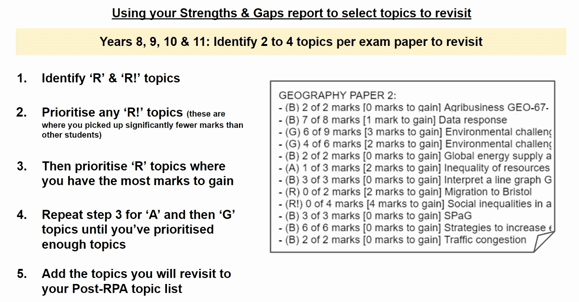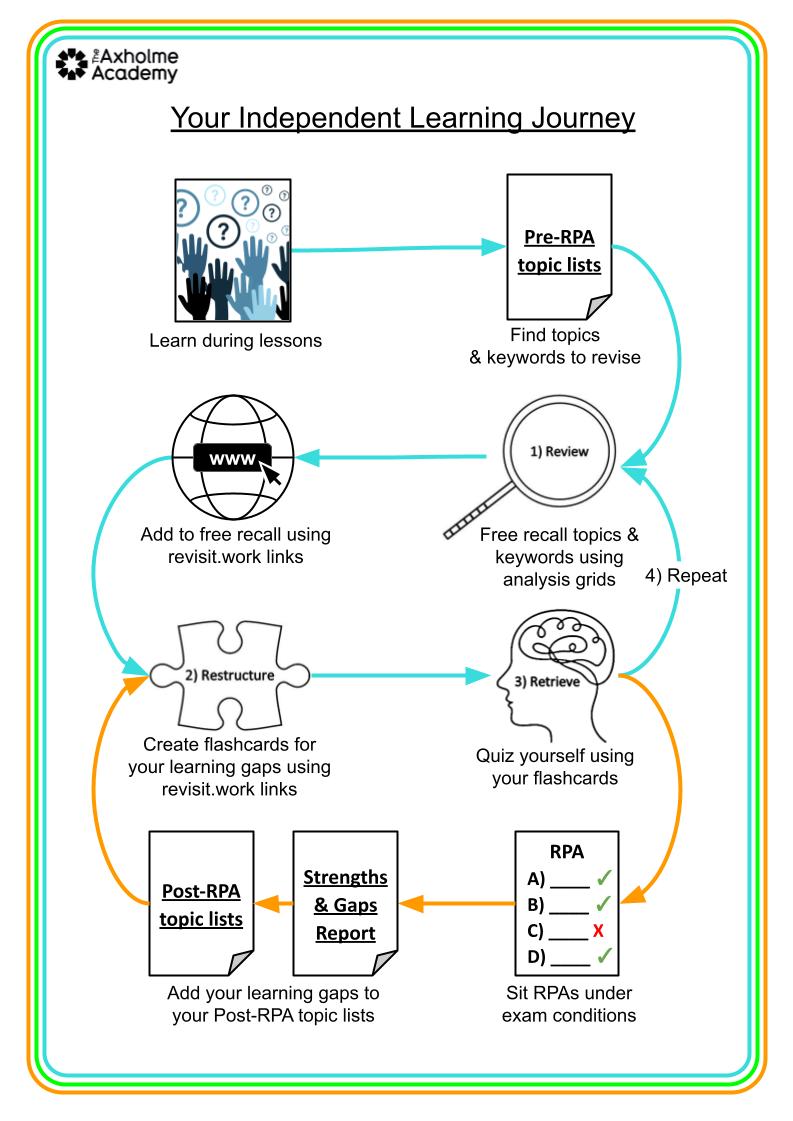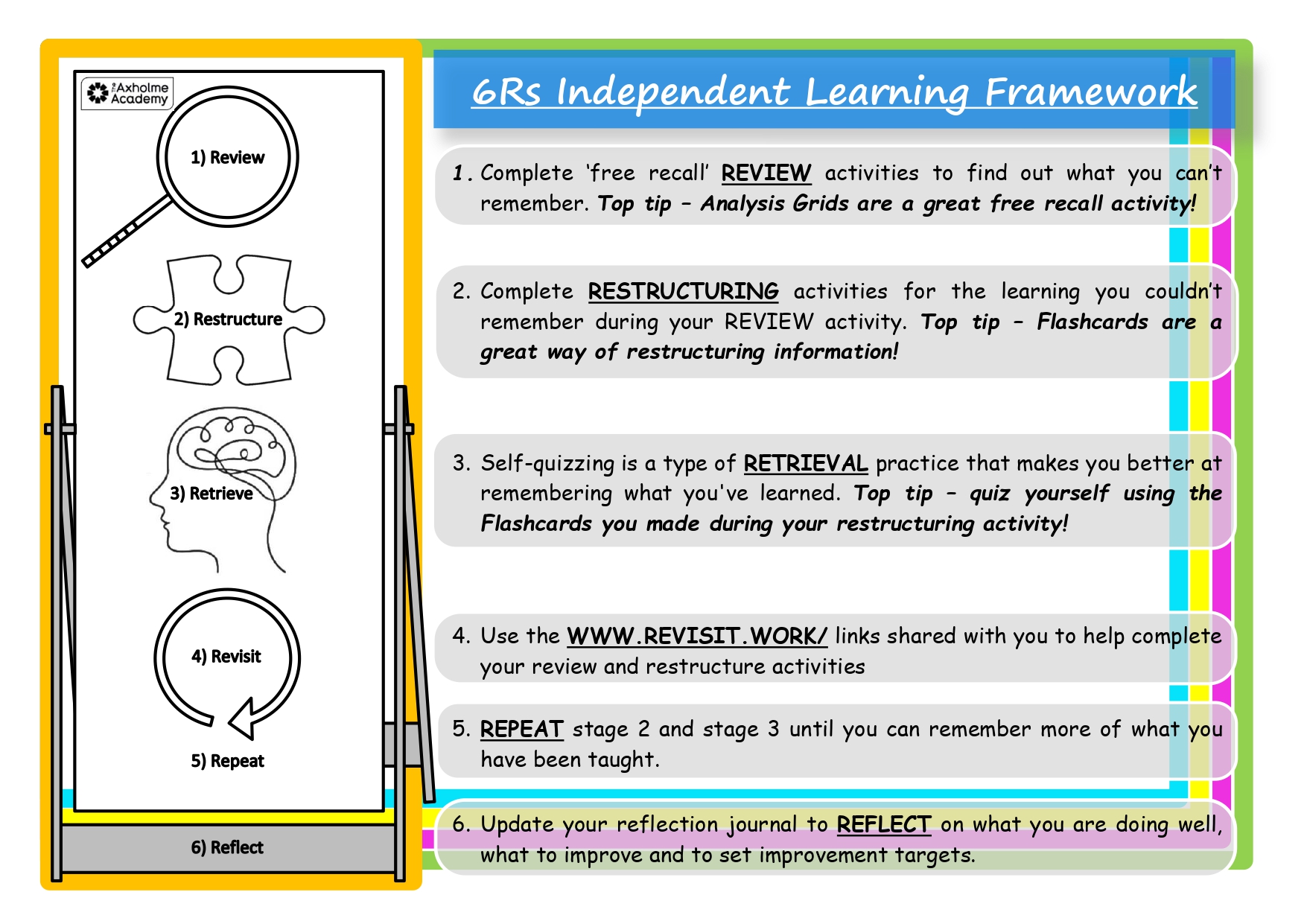Independent Learning
“Memory is the residue of thought”
(Daniel T. Willingham, Cognitive Scientist)
Independent Learning Journey
Our Independent Learning journey illustrates how students should study outside of the classroom to help them remember more of what they have been taught.
6Rs Independent Learning Framework
The evidence-based approaches below are guaranteed to help students know more and remember more:
Use the menu below for further 6Rs advice.
Review
Step 1 Choose a topic to work on (either a topic you've been taught recently or topics from your pre/post-RPA topic lists).
Step 2 Find out what you can remember by doing a free recall activity:
Step 3 Use our www.revisit.work links to find out what you can't remember. Add information that you've forgotten to your Review activity in a different colour pen.
Review activities can be done on plain paper or using an Analysis Grid structure available to download from the bottom of this page.
Restructure
Make your own flashcards for the learning added during step 3 of your Review activity:
Flashcard types:
- Q&A cards (question / answer on reverse)
- Keyword definitions (keyword / definition on reverse)
- Fill in the blanks (short sentence with keywords missing / missing keywords on reverse)
- Equations and formulae (name / formula or equation on reverse)
- Keyword definitions / descriptions (keywords or facts / definition or description on reverse)
- Translations (French word or phrase / English translation on reverse)
- Antonyms and synonyms (word / meaning or opposite meaning on reverse.
The most effective flashcards are:
- Simple (i.e. broken down to contain a single piece of knowledge, question or example)
- Overlapping (i.e. multiple cards question the same piece of knowledge differently)
- Numerous (i.e. it's better to have lots of cards containing a bit of information than a few cards containing lots of information)
Restructure document templates are available to download from the bottom of this page.
Retrieve
Quiz yourself using your flashcards:
Use the Leitner System for the most effective way of retrieving learning using flashcards:
Revisit
Pre-RPA Topic Lists
Students sit termly Retrieval Point Assessments to establish what they can recall under exam conditions. Students are told what topics to revise, keywords to learn and 'Revisit' resources to use when preparing for RPAs. An example of a Pre-RPA Topic List is below:
Once published, Pre-RPA topic lists are available to download from the bottom of this page.
Post-RPA Topic Lists
After each set of RPAs, students receive a Strengths & Gaps report showing how they performed on each topic assessed.
Students record their personal learning gaps and 'Revisit' resource links for each subject in their Post-RPA Topic List booklet to inform their independent study:
Reflect
All students have a Reflection Journal used to complete personal reflection and target setting for their:
- Study skills
- Learning & progress
- Attendance
- Behaviour
- Wider curriculum participation
The slide deck below guides students through the reflection process:
Revision Timetable
Key Stage 4 students are encouraged to produce a structured revision timetable once Pre-RPA Topic Lists have been published. An example (including guidance) is below:
A blank RPA revision timetable template is linked at the bottom of this page and here.
Strengths & Gaps Reports
Below is an example of a student's report:
The animation below demonstrates how students review Strengths & Gaps reports to find their learning gaps:

Independent Learning Tasks (ILTs)
ILTs are designed to support retention of learning and help develop students’ independent learning skills using the technique outlined above. Students are expected to spend 20-30 mins of focussed time per ILT and are set a maximum of:
-
1 x ILT per week in English, Maths and Science and 1 x ILT per fortnight in other subjects in Key Stage 3
-
1 x ILT per week in English, Maths, Science and option subjects in Key Stage 4
Please use the exams calendar link at the top of this page to see dates of any forthcoming RPAs or external exams.



